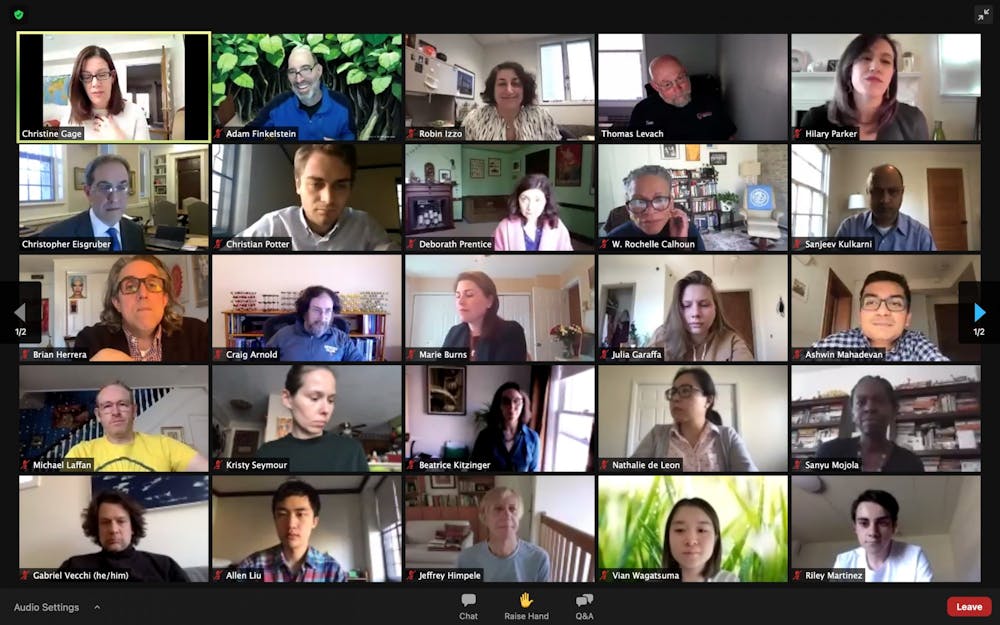The University committee responsible for reviewing divestment proposals will submit its recommendation on fossil fuel divestment to the Board of Trustees in May, geosciences professor and Resources Committee chair Blair Schoene told attendees of this month’s Council of the Princeton University Community (CPUC) meeting.
The proposal to consider divestment from fossil fuels was initially submitted to the CPUC Resources Committee on Feb. 13, 2020 by the environmentalist student group Divest Princeton. Since receiving the divestment proposal a year ago, Schoene said the Committee has taken several steps in the deliberation process. During the CPUC meeting, he described meetings with Divest Princeton, the Board of Trustees Committee on Finance, the Office of Sustainability, and other universities that have divested their endowments.
Schoene expressed confidence that the Board of Trustees would heed the Committee’s recommendations, but he would not comment on what those recommendations will be. The Resources Committee, he said, "is still working out some of the details of these recommendations before they are submitted and presented.”
The finalized recommendations will be presented at the CPUC meeting on May 3, according to Schoene.
The CPUC addressed four audience questions on the topic of divestment, and Schoene noted during one answer that the Resources Committee and Board of Trustees “have had many conversations” about this proposal and he is “confident the recommendations will be met with enthusiasm from the Board.”
“It’s important to highlight that in my five years on the Resources Committee — and I believe in the 10 years prior to that — the Resources Committee has not moved forward to submit a set of recommendations to the Board of Trustees,” Schoene said during the meeting. “So when we do this, it is a sign we are requesting action on behalf of the University."
However, President Christopher L. Eisgruber ’83 clarified that “The Board has an independent decision-making role.”
“I do think it’s very important that there has been conversation between the Committee and the Board of Trustees, but it’s important that they [the Board of Trustees] have the opportunity to exercise the judgment that’s there,” he continued.
Another item on this month’s CPUC meeting agenda was the University’s plan to make campus more accessible, which includes installing improved signage and updating campus maps. In an effort to increase accessibility, Nassau Hall is undergoing construction to house an elevator. Perelman College, one of the new residential colleges, will be built with accessible entrances and hallways.
Additionally, Provost Deborah Prentice reported on the University’s racial equity initiatives. She added that the most recent cohort of graduate school admits and faculty hires “has been our most diverse set... by a landslide.”
Prentice noted that a more substantial report on hiring diversity will come later, once this diverse group of graduate students and new faculty members have had time to integrate into the University community.
Also during the meeting, Robin Izzo, Executive Director of the Office of Environmental Health and Safety, presented the most recent update on expectations for the future regarding COVID-19 and vaccinations for the University community.

“In [Mercer County] there have not been many vaccine clinics available, which has been a continued issue,” she said. “On our campus, we don’t have any vaccines available.”
Izzo stressed that the University is prepared to distribute vaccines and set up clinics as soon as they become available.
She further explained that vaccinated individuals must continue to adhere to social distancing, testing, and mask regulations while on campus.
“The one thing that might change is that if [a vaccinated individual] has an exposure, or travels out of the state, their quarantine period might look different,” she said.
Looking ahead to the fall 2021 semester, Izzo said that the hope would be to operate “a little more normal[ly] on campus, without the need for social distancing.”
Additionally, Director for Wintersession and Campus Engagement Judy Jarvis recapped this year’s Wintersession, presenting data on registration, attendance, and feedback.
Over 2,000 people participated in at least one Wintersession workshop or event, according to the data. This is the first year that Wintersession events have been available to the entire University community, rather than just undergraduate students.
Jarvis noted that Wintersession received positive feedback from community members and that the focus of the program was to be “active, unexpected, and intriguing.”
The meeting concluded with a report from Undergraduate Student Government (USG) President Christian Potter ’22 on the goals, priorities, and achievements of USG.
Among the list of programs and initiatives already implemented this semester is the Tigers in Town social initiative, which connects student organizations on campus with local businesses in order to host events and has gathered attention and popularity from the campus community.
This meeting was held via Zoom on Monday, March 22 at 4:30 p.m.








